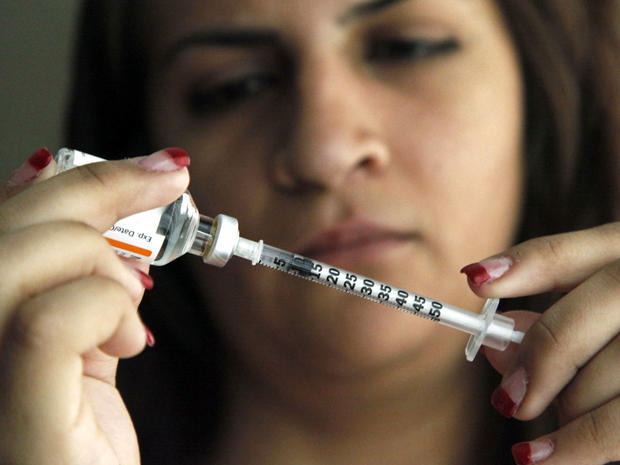Rising diabetes rates among overweight teens could lead to heart problems, researchers say
(CBS/AP) Half the nation's overweight teens risk heart attacks and other cardiovascular problems because they have unhealthy blood pressure, cholesterol or blood sugar levels, a new government study finds.
And an even larger proportion of obese adolescents have such a risk, according to the alarming new statistics.
U.S. obesity epidemic at standstill, CDC says
Type 2 diabetes tough to treat in overweight teens, study shows
"What this is saying, unfortunately, is that we're losing the battle early with many kids," said Dr. Stephen Daniels, a University of Colorado School of Medicine expert who was not involved in the study.
Daniels said these results are not good, since people can keep their risk of heart disease very low if they reach age 45 or 50 at normal weight and with normal blood pressure, normal cholesterol and no diabetes. The study was released Monday in the journal Pediatrics.
For the study, researchers from the Centers for Disease Control and Prevention focused on 3,383 adolescents ages 12 through 19, who were part of an intensive National Health and Nutrition Examination Survey (NHANES) that involves interviewing, weighing, measuring and performing medical tests on people across the country.
Overall the study found that 50 percent of overweight youths and 60 percent of obese youths had at least one risk factor for future heart disease. But normal-weight kids weren't in the clear - 37 percent had at least one risk factor and could face increased chances for heart trouble as adults, the study suggests.
The study showed that the percentage of adolescents who were diagnosed with diabetes or pre-diabetes rose dramatically, from 9 percent to 21 percent. Pre-diabetics have higher than normal blood sugar levels, but not high enough to count as diabetes.
The ongoing CDC study is considered a gold standard for looking at national health trends, said Dr. William Mahle, an Emory University pediatric cardiologist.
Mahle did say there there was some good news: The study found no increase in levels of obesity, high blood pressure or bad cholesterol during the years it covered - 1999 through 2008.
"All of us are looking for some sign or signal that we're making headway," said Mahle, who was not involved with the study. "So that was reassuring."
It's not clear why the proportion of kids with high blood sugar would increase while the measures for the other heart disease risk factors held steady.
Researchers said the results should be interpreted with caution because teens in the study were given a single blood test that can give varying results depending on the day or time of day the test is given. Other tests, though more involved and more expensive, are considered more precise. Daniels said it's possible another testing method might not have produced a swing so large.
That is possible, said Ashleigh May, the CDC epidemiologist who was the study's lead author.
"This study is just a first step to identify problems in youth. More work needs to be done to identify why this is happening and the advantages of using various test methods in this population," she said.
Still, she saw the results as a call of action to parents and adolescents.
"I think parents have the opportunity to encourage their children to engage in healthy lifestyles," May told The Washington Post said. "On the broader community level, we can promote healthy environments that make making healthy choices easier for kids."
What could parents do to curb these alarming rates?
Dr. Reginald Washington, chief medical officer of the Rocky Mountain Hospital for Children in Denver, and member of the Obesity Task Force for the American Academy of Pediatrics, told WebMD that parents should encourage smaller changes rather than major lifestyle overhauls.
If your teen has three sodas a day, suggest him or her cuts down to one to start, he said. Split an order of fries with the whole family rather than getting one for each. Walk around the block after dinner as a family.
The CDC has more tips on healthy eating.
